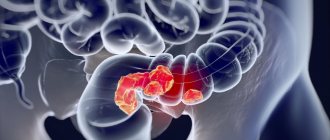Colon cancer is one of the types of malignant neoplasms that is located on the mucous membrane of the colon. This pathology is currently the second most common in people over 45 years of age. The location of intestinal cancer can be any, since the tumor forms on the mucous membrane of any part of the intestine. Colon cancer, the symptoms of which will be described in this article, differs from other cancers in its more severe course, serious complications and unfavorable prognosis. The main feature of this disease is the complete absence of significant painful manifestations at the initial stage of the disease. About 50% of bowel cancer cases are detected at advanced stages.
Causes of bowel cancer
The symptoms inherent in the pathology of intestinal cancer cannot reliably indicate the causes of their occurrence. It is still not completely clear what triggers the transformation of healthy cells into cancerous ones, however, in medical circles there are suggestions that the leading role in this process is played by:
- genetic predisposition to cancer;
- the presence of inflammatory and other pathological processes in different parts of the intestine - Crohn's disease, ulcerative colitis, polyps (certain types of them) and adenomas;
- poor nutrition (the menu includes a lot of meat, but few vegetables and fruits).
Stages of bowel cancer
Oncological diseases of the intestine in their development pass through 5 stages (degrees):
- Initial or zero stage - the accumulation of altered cells is insignificant, they quickly divide and can turn into cancer. The neoplasm is limited to the mucous membrane and can be completely eliminated with timely therapy.
- Stage 1 - the cells begin to degenerate into cancer, the formation increases in size, while remaining on the intestinal mucosa. At this stage there are also no symptoms, the only way to identify the disease is to determine hidden blood in the stool or do a fibrocolonoscopy, i.e. do the same Colon View test - an immunochemical stool test for occult blood, which you can do yourself.
- Stage 2 – the tumor grows and grows into the thickness of the intestinal wall. There are no metastases, and pathology can be suspected when the tumor is located in the rectum by discharge of blood or mucus, in the cecum by anemia that cannot be treated.
- Stage 3 – cancer cells increase activity, which is why the tumor grows rapidly, involving lymph nodes and tissues located nearby internal organs in the process. At this stage, colon cancer has obvious signs and symptoms, as lesions called regional lesions form. In the third stage, the tumor grows into the muscular layer of the intestine; most often, the tumor spreads to the lymph nodes and metastases to organs (mainly to the liver). The patient begins to be bothered by unpleasant symptoms.
- Stage 4 – the tumor develops to its maximum and begins to metastasize. The functioning of all organs is disrupted due to general intoxication of the body. The tumor grows throughout the entire wall of the colon, and therefore the passage of intestinal contents is completely disrupted, due to the narrowing of the intestinal lumen due to tumor growth.
Metastases of intestinal cancer tumors can be found in all internal organs, including the lymphatic system. On average, the life expectancy of patients with metastases ranges from six months to 2.5 years. The length of the survival period depends on many factors, including the number and location of metastases, as well as the general condition of the patient.
Contraindications
The operation is contraindicated under the following conditions:
- severe chronic diseases of the patient - arterial hypertension, coronary heart disease, when it is impossible to give anesthesia;
- advanced age of the patient;
- advanced stages of cancer.
In case of a widespread process with metastasis to many organs, palliative resections are used, aimed at alleviating the patient’s condition. Symptomatic operations - the application of bypass anastomoses to relieve the intestines and avoid complications in the last stages of cancer.
Types of bowel cancer
In oncology, there are several types of cancer, the definition of which takes into account how the tumor grows relative to the intestinal wall, as well as what cells it consists of. Bowel cancer can be:
- Exophytic - in which a malignant tumor protrudes into the intestinal lumen. This type of tumor most often forms in the right side of the colon and cecum.
- Endophytic - in which the tumor grows through the entire intestinal wall. This type of oncology is localized primarily in the left side of the colon.
- Mixed – in which tumor growth combines the characteristics of previously described types of cancer.
Depending on the structure of the cells, intestinal cancer may have different signs and symptoms, which may also mean that the tumor belongs to one of the following types:
- adenocarcinoma;
- squamous cell carcinoma;
- signet ring cell carcinoma;
- colloid cancer.
There is also a separate category of tumors that cannot be differentiated and classified.
Instrumental and laboratory studies help determine the cellular structure and type of cancer formation, and the impetus for their onset is the first signs of intestinal cancer at an early stage. The information obtained helps to competently plan therapy to achieve faster results - recovery or long-term remission.
List of sources
- Vorobyov G.I., Odaryuk T.S., Shelygin Yu.A. Diagnosis and treatment of colon cancer // Russian Medical Journal. 1998. T 6, No. 19. P. 1244-1256.
- Karasev I.A., Malikhova O.A., Davydkina T.S. The role of intestinal microbiota in the pathogenesis of colorectal cancer. Review of literature data. Malignant tumors. 2020;10(3s1):60-62.
- Colon cancer: diagnosis and treatment: method. allowance / A. A. Zakharenko, V. A. Rybalchenko, M. A. Belyaev [and others]. – St. Petersburg: RIC PSPbSMU, 2022. – 24 p.
- Chissov V.I., Daryalova S.L. Clinical recommendations. Oncology. M.: GEOTAR-Media, 2006. 352 p.
Early signs of bowel cancer
According to statistics, most often oncological formations in the intestines are discovered during preventive examinations. And this is not accidental, because intestinal cancer does not always have the first symptoms so obvious that the patient has no doubt about the onset of the disease. On the contrary, the disease manifests itself with minor discomfort for a long time, or is asymptomatic.
There is a theory that cancer cells, at the initial stage of their development, secrete specific compounds that eliminate pain in order to “mask” the tumor process until its maximum development.
However, with the onset of pathological processes, the first signs of intestinal cancer (the first symptoms of the disease) occur, and they can be recognized by the syndromes that appear:
- Enterocolic syndrome, expressed in constant fermentation of intestinal contents, prolonged constipation with sudden diarrhea and bloating, and impaired formation of feces. This set of symptoms is typical for cancer of the left side of the colon.
- Stenosing syndrome, expressed by difficulty in defecation, which occurs as a result of partial or complete blocking of the rectal lumen by a tumor. The process is accompanied by acute pain, which can be cramping in nature. The patient may also be concerned about bleeding and a change in the nature of the stool, in which the stool takes the form of thin cylinders or ribbons and contains a significant admixture of blood. This syndrome is characteristic of cancer of the rectum or sigmoid colon in advanced stages, as well as cancer of the left half of the colon.
- Dyspeptic syndrome, expressed by digestive disorders - nausea, vomiting, painful persistent heartburn, sour belching and a bitter taste in the mouth. Similar symptoms of bowel cancer in women and men can be mistaken for common dyspeptic disorders. In contrast, in the presence of a malignant tumor, the discomfort lasts much longer and does not go away after taking medications.
- Pseudo-inflammatory syndrome is the only type of syndrome in which there is an elevated temperature in intestinal cancer, expressed by a general deterioration in health against the background of acute abdominal pain, intoxication, and an inflammatory process affecting the leaves of the peritoneum. Often it ends with the development of peritonitis. Along with this, patients experience painful urination, hematuria (blood in the urine), menstrual irregularities, and spotting from the vagina. Similar signs of intestinal cancer in women can be mistaken for pathology of the uterus and appendages. This syndrome is also quite advanced tumors that can grow into the wall of nearby tumors (uterus, vagina, bladder, prostate gland, ureters).
Symptoms of intestinal cancer depending on the location of the tumor
With a disease such as intestinal cancer, symptoms vary mainly depending on the location of the tumor. This is what allows doctors, even at the time of external examination and history taking, to predict in which part of the intestine there are neoplasms.
Small intestinal cancer, in which the tumor is located in the ileum, jejunum and duodenum, is a fairly rare occurrence. The following symptoms are typical for this case:
- dyspeptic disorders - belching, feeling of pressure in the stomach, heartburn, nausea;
- aversion to food;
- soreness in any part of the abdomen;
- dark coloration of stool.
In the presence of malignant neoplasms in the large intestine, namely in the cecum, colon or sigmoid, as well as the rectum, intestinal cancer symptoms in the early stages vary depending on the location of the tumor:
- when the right side of the colon is affected, anemia develops against the background of constant small intestinal bleeding. Pain and symptoms of cancer occur when the tumor is advanced, when it grows into the intestinal wall, nearby organs, and intestinal function is disrupted. the process is accompanied by acute pain;
- when the left side of the colon is affected, cramping pain in the abdomen occurs, stool becomes irregular (constipation is replaced by diarrhea), the patient is bothered by bloating of the left side of the abdomen, and partial intestinal obstruction develops.
With rectal cancer, patients experience:
- false urge to defecate;
- mucous and/or purulent discharge;
- sharp pain in the lower abdomen and perineum that occurs before and during bowel movements;
- gas and fecal incontinence;
- discharge of blood during defecation.
Differences in signs of bowel cancer in women and men
In most cases, the symptoms of bowel cancer in women and men have some differences due to damage to organs in the immediate vicinity of the tumor. Thus, when the genitourinary organs are involved in the tumor process, women may experience the release of gas and feces from the vagina. This process is caused by the formation of a rectovaginal fistula. When the uterus is damaged in the initial stages, it is not expressed by noticeable clinical manifestations.
In men with intestinal cancer, the prostate gland is involved in the pathological process, and therefore they begin to worry about difficulty urinating. The symptoms are similar to prostatitis or prostate adenoma.
Otherwise, men and women have identical symptoms of bowel cancer in the early stages.
Diet
Diet (nutrition) for intestinal cancer
- Efficacy: no data
- Timing: constantly
- Cost of products: 1800-3800 rubles. in Week
Proper organization of nutrition for intestinal cancer is very important, as this is one of the points of the overall treatment plan. The patient needs both a special diet to maintain immunity and proper nutrition after intestinal surgery.
When organizing meals, it is important to adhere to the following tips:
- Foods with preservatives, dyes and chemical components should be excluded.
- Fats should be kept to a minimum, and sugar and sweets should be completely avoided.
- The menu should contain only fresh and high-quality products.
For intestinal oncology and after surgery, the diet should include the following foods and dishes:
- Rice.
- Greenery
- Eggs.
- Dried fruits.
- Liver.
- Seafood.
- Whole grain porridge.
- Soups and broths are low-fat.
- Steamed pumpkin dishes.
At the same time, you must avoid the following foods:
- Hydrogenated oil.
- Sausages and other processed meat products.
- Baked goods and dishes made from white flour.
- Sugar and artificial sweeteners.
- Alcohol.
Diagnosis of bowel cancer
The simplest method by which you can detect intestinal cancer is a test for occult blood in the stool. The release of a small amount of blood into the intestinal lumen is characteristic of many types of intestinal cancer at an early stage, and this is what the test is based on. For people at risk of cancer after the age of 45, it is recommended to do it annually. At the same time, along with laboratory tests in the clinic, you can use tests for independent detection of occult blood in the stool. One of them is Colon View hb and hb/hp, which detects traces of intestinal bleeding in just 15 minutes.
In addition to the test, malignant neoplasms in the intestines can be diagnosed using the following methods:
- digital examination (used for rectal cancer);
- sigmoidoscopy (used to detect tumors in the rectum and sigmoid colon);
- colonoscopy (used to diagnose tumors in any part of the intestine);
- CT scan;
- Ultrasound, MRI, radiography and other additional diagnostic methods.
Bowel cancer treatment
The leading role in the treatment of intestinal cancer is played by surgical treatment: removal of the right or left half of the intestine, depending on the location of the tumor, the so-called colon resection. These can be standard operations, or extended operations when nearby organs and metastases are involved in the tumor process. To increase the effectiveness of surgery, radiation and chemotherapy are additionally used. For inoperable forms of intestinal cancer, symptomatic treatment is carried out, which is supplemented with chemotherapy.
Traditional methods of treating intestinal cancer in 99% of cases do not lead to improvement in the patient's condition. Moreover, they do not affect the tumor in any way, that is, they do not help inhibit its growth and do not prevent the formation of metastases. By using them instead of the therapy prescribed by the doctor, the patient risks losing precious time, which is worth its weight in gold in cancer treatment. In medical practice, there are cases when the situation changed from favorable to extremely unfavorable within a few days.
The earlier bowel cancer is detected and treatment started, the higher the chance of recovery. Thus, when intestinal cancer is detected at the first stage, the five-year survival rate is 90% or more, while for stage 2 and 3 cancer this figure drops to 84% and 55%, respectively. The most unfavorable prognosis is for patients with stage 4 colon cancer. They have a five-year survival rate of less than 1%.
Pathogenesis
The colon has the highest bacterial density and diversity throughout the gastrointestinal tract. This indicates that the mural microbiome plays an important role in the pathogenesis of the disease. At this stage, the pathogenesis of colorectal cancer is still being actively studied. However, research suggests that some types of bacteria contribute to tumorigenesis.
It has been noted that the increase in cases of this type of cancer in developed countries is associated with a high meat content in the diet and, accordingly, a decrease in the amount of fiber consumed. As a result of such nutrition, the growth of intestinal bacteria is activated, which, in turn, produce carcinogens.
There are also a number of other risk factors: chronic inflammatory diseases of the colon, bad habits, heredity, etc.









